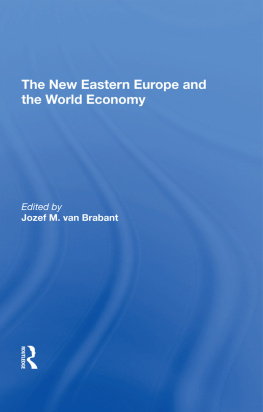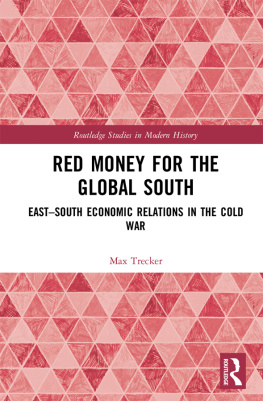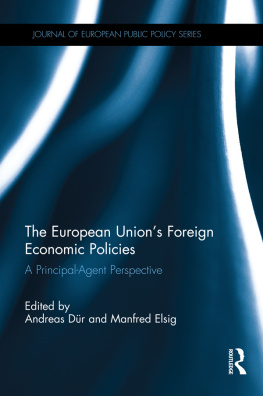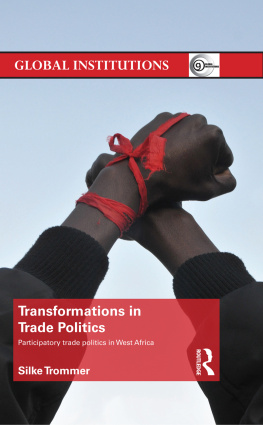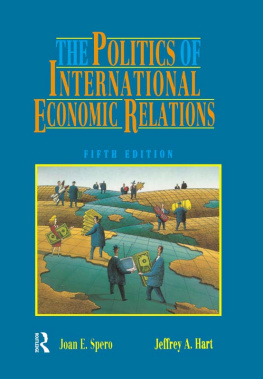The New Eastern Europe and the World Economy
Eastern Europe After Communism
Sabrina Petra Ramet, Series Editor
Since the collapse of communism throughout Eastern Europe, 19891990, the societies of the region have begun searching for new social and political formulae, setting new tasks, and facing new challenges. New social forces have arisen, such as nationalism and chauvinism, and preexisting social institutions and groupings, such as the churches and feminist groups, have intensified their activity. Above all, Eastern Europe is dominated, in the years following the collapse, by the twin tasks of democratization and privatization, tasks that are complex and multifaceted, with consequences that reach far beyond the formal goals associated with these processes.
This new series is designed to provide a set of windows on the changing realities of Eastern Europe and to chart these societies courses as they attempt to deal with the legacy of communism and the problems of transition. This volume tackles the economic challenges facing all of Eastern Europe. Future volumes will examine the security context and offer perspectives on each country in the region.
Books in This Series
The New Eastern Europe and the World Economy, edited by Jozef M. van Brabant
FORTHCOMING
Beyond Yugoslavia: Politics, Economics, and Culture in a Shattered Community, edited by Sabrina P. Ramet and Ljubisa Adamovic
Albania and the Albanians, Elez Biberaj
To my three ladies: Anja, Katja, and Miyuki
First published 1993 by Westview Press
Published 2019 by Routledge
52 Vanderbilt Avenue, New York, NY 10017
2 Park Square, Milton Park, Abingdon, Oxon OX14 4RN
Routledge is an imprint of the Taylor & Francis Group, an informa business
Copyright 1993 Taylor & Francis
All rights reserved. No part of this book may be reprinted or reproduced or utilised in any form or by any electronic, mechanical, or other means, now known or hereafter invented, including photocopying and recording, or in any information storage or retrieval system, without permission in writing from the publishers.
Notice:
Product or corporate names may be trademarks or registered trademarks, and are used only for identification and explanation without intent to infringe.
A CIP record for this book is available from the library of Congress.
ISBN 13: 978-0-367-29433-5 (hbk)
Contents
, Jozef M. van Brabant
, Ben Slay
, Jozef M. van Brabant
, Harriet Matejka
, Jozef M. van Brabant
, Joseph E. Smolik
, Mikls Losoncz
, Wladimir Andreff
, Giovanni Graziani
Guide
Although this volume is directed at analyzing critical elements of the transitions in the former planned economies of Europe, its ultimate gestation became in part a victim of that very transition. Not that I would claim intervention on the part of the policy makers of one transition process or another. But die demands on the scarce time of a comparatively small number of specialists who could dissect the defects of central planning and its legacies, and bring that knowledge to bear for an insightful treatment of what is likely to happen in external relations under conditions of transition did have its negative impacts both on the conceptualization and the final production of the book.
This volume is one of the series Eastern Europe After Communism , under the general editorship of Sabrina Petra Ramet When first conceived in late 1988 under the editorshop of Vladimir Sobell, this volume had a dual focus. On the one hand, it was intended to examine opportunities for prospectively improving regional economic cooperation in the eastern part of Europe, given ongoing tinkering with the administrative planning systems in place and the significant ferment about socialist economic integration that had been crystallizing from the mid-1980s on. On the other hand, it was to assess how these emerging trends could inhibit or complicate the association of the still partly planned economies through formal ties with the multilateral economic organizations and less formal relations, through trade, financial, and factor mobility with the western economies.
The marked changes that occurred in Eastern Europe in late 1989 and early 1990 made it imperative to reconceive the entire purpose of the volume, almost from square one. Mr. Sobell withdrew from the project and I was entrusted with that new task. Rather than continue to focus on how transforming planning systems could be rendered compatible with various international economic regimes or established trading, pricing, financing, and investment practices, it was decided that the central emphasis of the volume should be on looking forward, towards the implications of the various transitions for the near-term and eventual position of these economies in the global economic environment as best as one could grasp emerging trends.
As a result a completely new outline and list of contributors was assembled. Unfortunately, because of the demands on the time of several individuals who had initially pledged to contribute a paper against a fairly tight delivery deadline, they felt compelled to withdraw from the project unless successive claims for more time in order to ready the manuscripts could be extended. I labored between disappointing those who contributed on time, or at least within tolerable delays, and others who would have wished to delay publication for another 3 to 6 months. In the end, I decided to assemble the product and ready it for publication with fewer contributors than had originally been envisaged.
Under the circumstances, I would be remiss if I did not take this opportunity to express my sincere gratitude to all those who have borne with me throughout this project and who have taken my repeated prodding, cajoling, and at times (mostly friendly) threats with a sense of forbearance and good humor.
I have edited this volume on my own time. Nonetheless, as staff member of the Department of Economic and Social Development of the United Nations Secretariat in New York, I should like to stress that the views advocated and the analyses presented here by any of my colleagues or myself do not reflect views that any of the United Nations organs may have on the matter. Each of the authors is responsible for the printed contributions and where I as editor have added or subtracted from the delivered manuscript, ultimate responsibility is mine only.
And a final word of thanks to my three ladies, especially Miyuki, my nearly silent and understanding partner, through thick and thin, for about a quarter century.
Jozef M. van Brabant
| BIS | Bank for International Settlements |
| BTPA | bilateral trade and payments agreements |
| CAP | Common Agricultural Policy |
| CEPU | Central European Payments Union |
| CIS | Commonwealth of Independent States |
| CMEA | Council for Mutual Economic Assistance |
| CoCom | Coordinating Committee for Multilateral Export Controls |
| SFR | Czech and Slovak Federal Republic |
| EBRD | European Bank for Reconstruction and Development |
| EC | European Communities |
| ECO | Economic Cooperation Organization |
| ECSC | European Coal and Steel Community |

